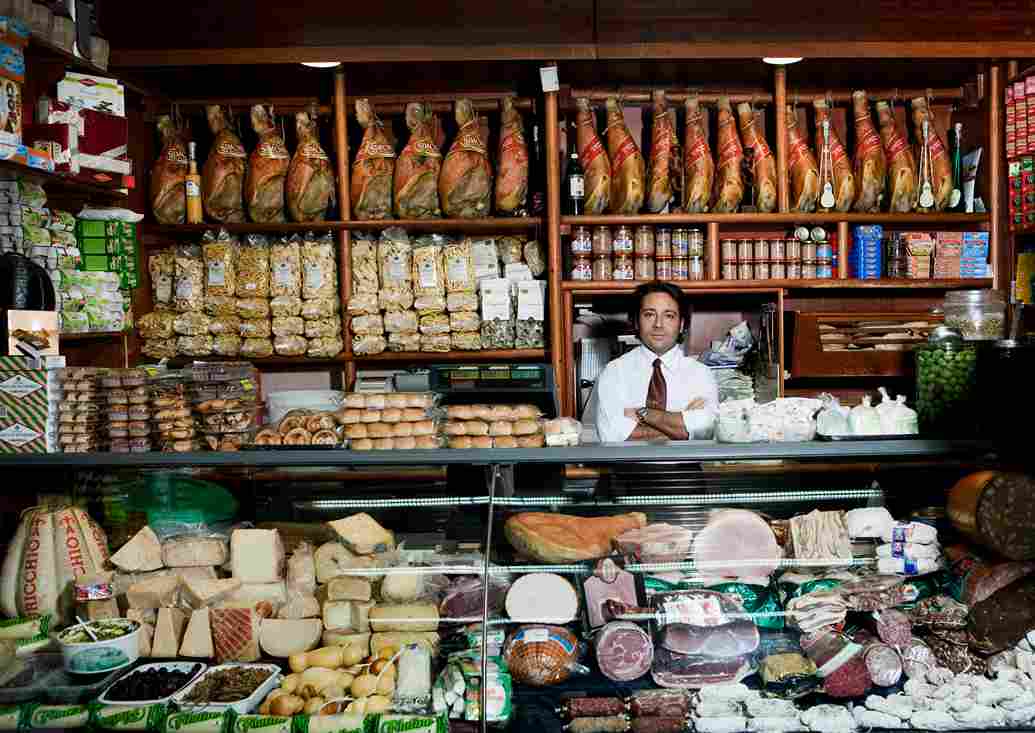How to turn food business ideas into the taste of success

Launching a food business isn't just about feeding hungry customers, it's about carving an unforgettable niche in the culinary world. Whether you're dreaming of a cozy neighborhood cafe, a bustling food truck or the next famous restaurant, the path from idea to accomplishment is thrilling and daunting.
The food service industry is due to grow by 10% per year, but on the flipside, roughly 80% of food businesses fail in the first five years.
In this guide, we'll look at turning your delicious visions into profitable realities and explore the tried-and-true recipes for culinary triumph.
So grab your apron, sharpen your knives and let's start on a culinary adventure where every bite is a step closer to achieving the ultimate flavor of success.
Getting a great food business idea
Every successful food entrepreneurship begins with a great idea that ignites passion and captures the imagination.
But where do these mouthwatering concepts come from and how can you ensure yours stands out in a crowded culinary field?
Among the top strategies for helping you uncover the perfect recipe for your food business venture are:
-
Follow your taste buds: reflect on your favorite foods, cooking styles and dining experiences. Consider how you can translate these preferences into a unique concept that satisfies a specific niche in the market
-
Identify market gaps: look for untapped opportunities and emerging trends in the market where your expertise, creativity or cultural background can fill a need or provide a fresh perspective. Analyze consumer preferences, dietary trends and demographic data to find a good niche
-
Solve a problem: whether it's providing healthier options, catering to specific dietary restrictions or offering convenient meal solutions, think about how your concept can meet the needs of your target audience in a unique and compelling way
-
Tap into your heritage: draw inspiration from your cultural heritage, family traditions or regional cuisine to create a food concept that celebrates authenticity and diversity. Focus on the storytelling aspect of food to connect with customers on a deeper level and create memorable dining experiences
-
Innovate and experiment: don't be afraid to think outside the box and push the boundaries of traditional culinary norms. Experiment with fusion cuisines, unexpected flavor combinations or novel dining concepts to differentiate your business and capture the imagination of adventurous food enthusiasts
How to make a business plan for a food business
A well-thought-out plan serves as a roadmap, guiding you through the various stages of development and helping you navigate the challenges of launching and running a food business.
Below is a step-by-step guide to creating a business plan tailored specifically to your culinary enterprise:
-
Define your vision and mission: what is the purpose of your venture and what do you hope to achieve? Define your core values, brand identity and the unique selling proposition that sets your business apart from competitors
-
Conduct market research: gain a deep understanding of your target market, including consumer preferences, demographics and behavior patterns. Analyze industry trends, competition and regulatory requirements specific to the food sector
-
Outline your products or services: clearly define what you plan to offer, including menu items, pricing strategy and any additional offerings such as catering, delivery or retail sales. Highlight the unique features, quality standards and culinary innovations that differentiate your business in the marketplace
-
Create an operational plan: arrange details such as location, equipment and supplies, staffing requirements and workflow processes. Develop a plan for sourcing ingredients, managing inventory and maintaining quality control
-
Financial projections and budgeting: consider revenue forecasts, expense estimates and cash flow projections for the first few years of operation. Work out startup costs, ongoing expenses and potential revenue streams to assess the financial feasibility of your business model
-
Secure funding: explore options such as personal savings, loans, investment from family and friends, crowdfunding or venture capital. Present your business plan to potential investors or lenders to secure the necessary funding that brings your vision to life
-
Monitor and adapt: your business plan is a flexible document that should be regularly reviewed and updated to reflect changing market conditions, customer feedback and internal operations. Continuously monitor your progress against your goals and adjust your strategies as needed to stay competitive and achieve long-term success
Business plans are an integral part of any business degree course and culinary arts degree. These qualifications can help you make a solid roadmap for your entrepreneurial endeavor.
Get the right licenses
To ensure your food business operates legally and maintains customer trust, it's essential to obtain any required licenses and permits.
Start by researching local regulations through government agencies or online resources to understand the specific requirements for your area.
Secure essential permits such as a food handler's permit for staff involved in food preparation and a business license to operate legally.
If you're running a restaurant, food truck or catering business, obtain a food establishment permit from the local health department.
You also need to register your business with relevant government agencies, providing all the necessary documentation.
Be sure to also adhere to food safety regulations, including proper handling, storage and sanitation practices. Depending on your business, you may need additional permits for alcohol service, outdoor seating or food sampling.

Choosing the right location: brick-and-mortar vs online presence
Selecting the right place for your business is a critical decision that can significantly impact its success. Whether to establish a brick-and-mortar establishment or focus solely on an online presence depends on various factors, including your target market, business model and budget.
Some things to consider about a brick-and-mortar location include:
-
Establishing a physical storefront offers a tangible presence in the community and allows for face-to-face interaction with people, helping build a loyal customer base
-
A well-chosen location in a high-traffic area can attract walk-in customers and drive sales through visibility and foot traffic
-
Brick-and-mortar establishments provide a unique dining experience, ambiance and atmosphere that online platforms cannot replicate
-
Operating a physical location may require significant upfront investment in lease or purchase costs, renovations, equipment and staffing
-
Factors such as demographics, competition, zoning regulations and accessibility when selecting a brick-and-mortar location
However, if you are planning on online presence, it is worth looking at matters such as:
-
Launching an online presence such as a website, mobile app or social media platform offers flexibility and scalability without the constraints of a physical location
-
An online presence allows you to reach a wider audience for food products beyond your immediate geographic area, potentially increasing sales and brand visibility
-
Operating online can reduce overhead costs associated with leasing or owning a physical space, utilities and maintenance
-
Digital marketing strategies, such as social media marketing, search engine optimization and email marketing, to drive traffic and engagement online
-
The logistics of packaging, shipping and delivery for online orders, as well as customer service
Marketing and brand identity
This is not just about promoting products or services; it's about communicating your brand's story, values and personality to your target audience.
Let's look at some marketing strategies and tips that can improve and strengthen your brand identity:
-
Define your brand persona: be sure you know the personality, voice and tone that represent your business. Consider your brand values, mission and target audience demographics to craft a compelling brand persona
-
Consistent visual identity: logos, colors, typography and imagery are essential components of your brand identity. Consistent visual branding reinforces brand recognition and strengthens brand recall among consumers
-
Storytelling and brand narrative: share the story behind your food business –
the inspiration, journey and passion that drive your culinary creations. Authentic storytelling creates a personal connection with consumers and humanizes your brand
-
Targeted marketing campaigns: use demographic data, market research and consumer insights to develop targeted messaging and creative content that speaks directly to your audience's needs and desires
-
Engage with your community: form meaningful interactions with your audience through social media engagement, responding to customer inquiries and feedback and participating in local events or collaborations. Actively listen to your customers, solicit their input and use their feedback
-
Showcase your unique selling proposition: whether it's your commitment to sustainability, use of locally sourced ingredients, innovative culinary techniques or exceptional customer service, emphasize what makes your brand special
How a culinary degree can help you create a successful food business
Pursuing a culinary degree can be a significant asset for aspiring food entrepreneurs, offering a comprehensive foundation in culinary techniques, food safety practices and business management skills.
Through hands-on training and coursework, culinary graduates gain mastery of cooking skills, an understanding of food safety regulations and exposure to diverse culinary traditions and ingredients.
This knowledge helps them develop innovative menu offerings, ensure compliance with health codes and effectively manage the operations of their food businesses.
As well as the cooking classes during a degree, culinary degree programs provide valuable networking opportunities and exposure to industry professionals, enabling you to make connections that can lead to partnerships, mentorship and career advancement in the food industry.
Overall, a culinary degree provides aspiring food entrepreneurs with the knowledge, skills and experiences necessary to turn their culinary passion into a successful and thriving food business.
Conclusion
Turning a culinary passion into a successful business requires a combination of creativity, determination and strategic planning.
From conceptualizing unique food business ideas to navigating regulatory requirements, securing funding, building a compelling brand identity and leveraging culinary expertise, the path to culinary success is as rewarding as it is challenging.
By embracing innovation, adapting to market trends and prioritizing customer satisfaction, aspiring food entrepreneurs can overcome obstacles and carve out their niche in the competitive culinary sector.
There are plenty of possible food businesses that could become successful, so all this hard work can pay off. If you want to get a good foundation of knowledge to start your own food venture, you could start by studying for a degree at a culinary school such as Ecole Ducasse.


